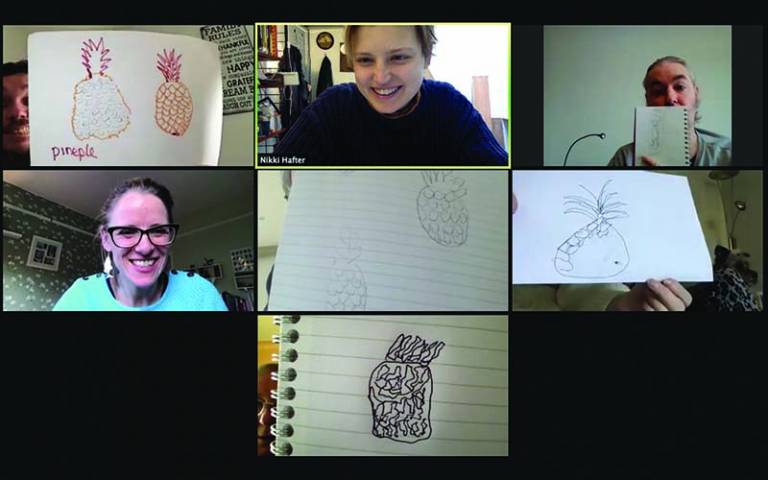UCL and partners: helping make conversation easier for people with aphasia
7 September 2021
People with aphasia are learning to have more successful conversations, thanks to a new creative wellbeing course developed by UCL, a charity and arts organisation.

Aphasia is a serious communication difficulty that affects how people speak, understand, read and write words. It’s something that can develop after a brain injury, and 350,000 people are currently living with it in the UK.
Yet only 5% of the population have even heard of it, making what can be a challenging condition also a very lonely place to be.
“Imagine not being able to speak like you can now. Not being able to order a coffee in a café, share your day with your partner, chat to your kids. That’s what it’s like for people living with aphasia. They’ve lost their language. It robs them of their ability to connect,” explained Firle Beckley, a speech and language therapist and PhD student based at UCL.
Firle has been instrumental in setting up the Art of Conversation with Aphasia, a new eight-week creative wellbeing course for people with aphasia. Drawing on research from UCL’s Better Conversation Research Lab, the course has been co-designed by a team from UCL, the De La Warr Pavilion and the charity SayAphasia.
“We use art to inspire conversation between the group, while also weaving in what we know about conversations from our research, to give people with aphasia and their family and friends new conversation techniques and tools,” said Firle.
Funded by UCL’s Higher Education Innovation Fund (HEIF), the project has received support from the Business and Innovation Partnerships team in UCL Innovation & Enterprise.
Firle and her collaborators are now working on plans to open up the training to many more people living with this challenging condition.
Read the full story on the UCL News website.
Links
Find out more about:
- The Art of Conversation with Aphasia
- Video: The Art of Conversation with Aphasia
- Say Aphasia
- De La Warr Pavilion
- UCL Better Conversations Lab
- UCL knowledge exchange and innovation funding
- Support for external organisations to partner with UCL
Photo is of participants on the ‘Art of Conversation with Aphasia’ wellbeing course, when it was held online. © The Art of Conversation with Aphasia.
 Close
Close

